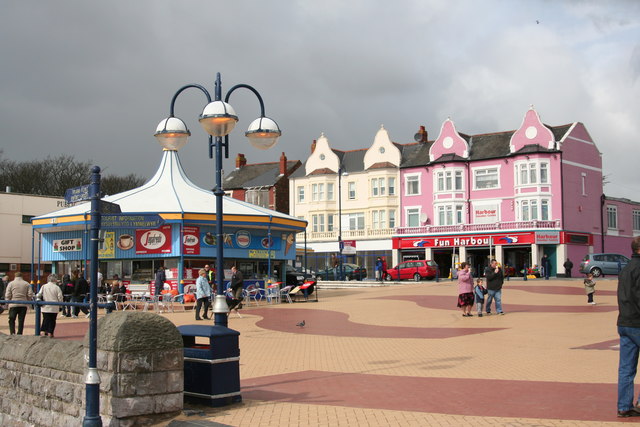
Featured Image: ‘ST1166: Barry Island seafront March 2008 Amusement Arcades Gavin & Stacey‘ by Eddie Reed is from Geograph and is licensed under CC BY-SA 4.0 (link to the license deed). Link to old license.
This week, I decided to binge-watch one of my favourite television programmes of all time: Gavin & Stacey. The reason why I love it so much, why I can quote large sections of it, and why I constantly return to it is not because of the brilliant acting, the hilarious jokes, or the fantastic soundtrack; but the way it exemplifies modern Britain and its politics.
The show, written by Ruth Jones and James Corden, piloted in 2007 and ran for three seasons until New Year’s Day of 2010. For those unfortunate enough not to have seen it, the plot concerns a twenty-something couple madly in love with each other, whose different worlds collide. Gavin Shipman (Mathew Horne) is the only child from a middle-class family in Billericay, Essex, and works in a bog-standard office job. Stacey West (Joanna Page) is from a working-class background in Barry, South Wales, and similarly works in an office role — which is how the two meet. Both are from close-knit families and communities, and it is these that confront each other in an almost Shakespearean way after the couple announce their intentions to wed.
I believe the reason for the show’s widespread popularity is its ability to speak to absolutely everyone in the country. There is at least one aspect of the series that everyone, from Land’s End to John O’Groats, can relate to. It could be the family dynamics, the way friendships are portrayed, or the socio-economic circumstances that are shown. This is what sets Gavin & Stacey apart from other great television programmes. Bread was a terrific representation of working-class family life in Liverpool at the time, Fresh Meat successfully shows what student life is often like, and The Vicar of Dibley is a great presentation of rural Middle England. Despite these all being fantastic sitcoms, none of them encompass the entirety of Britain like Gavin & Stacey does.
It doesn’t matter if you’re old or young, middle or working-class, from a decrepit seaside town or a booming city — you will watch Gavin & Stacey and immediately recognise a bit of your own life in there somewhere. That is something that Jones and Corden create through exceptional writing and by being truly authentic. Far too many television shows miss the mark by creating a Britain that does not exist. A Britain where everyone is technologically capable, a Britain where everyone has enjoyable and fulfilling employment, or a Britain where everyone is a politically correct progressive. These Britains don’t exist. A good show, film, play, or advertisement shows British society how it really is — warts and all.
Gavin & Stacey does this well, as all the principal characters are flawed — mirroring a reality where all people are flawed. The show includes many instances of prejudice and casual bigotry from the main characters. This isn’t a narrative feature that seeks to compel the viewer to dislike the character, it is merely an accurate portrayal of the median British household. One clever joke in the second series is when Nessa (Ruth Jones) explains to Stacey the reasons she dislikes the character Smithy (James Corden), ending with the fact that “he’s English”. Stacey replies, “Now you’re just being racist”, to which Nessa responds, “It’s not racism Stace, it’s xenophobia”. It is the embrace of societal flaws which makes the show such a good showcase of life and politics in 21st century Britain.
Other programmes exhibit the tragic flaws of the nation as well, but oftentimes these are taken to an unrecognisable extreme. Gavin & Stacey could involve characters adhering to a stark Welsh nationalist ideology or embracing an exaggerated Tory Middle England snobbery, but thankfully it confronts politics far better than that. These political beliefs are displayed in the characters, but in a wonderfully subtle way. This is because, in reality, British society is deeply political, but politics is never at the forefront of people’s lives.
Most people are exactly like the two families represented in the programme. They are subject to circumstances of socio-economic background and geography, which undoubtedly determine their political beliefs, their vote, and the way they view other parts of the country. However, at the end of the day, it is other issues which dominate their time. Love and relationships, friendships, family, employment, and health are the things that govern people’s lives — not the merits of devolution, or the extent of market-intervention.
We are not a country of fascist skinheads, woke youth activists, nationalist xenophobes, militant trade unionists, or aristocratic monarchists. We are a country of ordinary families like the Wests and the Shipmans, who are divided by political barriers and can often find it difficult to understand each other’s lifestyles. But also, families who know and care very little about those political divides and, in reality, are easily brought together by love and friendship.



Average Rating